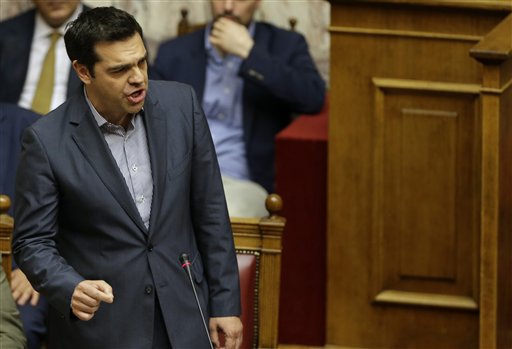
Greece’s Prime Minister Alexis Tsipras reacts as he speaks during a parliament meeting in Athens, Saturday, July 11, 2015. Greek lawmakers have approved a government motion seeking authorization for reform proposals as a basis for negotiations for a third bailout in talks with international creditors this weekend. AP
ATHENS, Greece — Greece’s negotiators head to Brussels on Saturday armed with their reform proposals and parliamentary backing to seek a third bailout, but with the shadow of severe dissent from governing lawmakers hanging over them.
Finance Minister Euclid Tsakalotos was to meet with his 18 colleagues from the other eurozone countries Saturday afternoon to discuss the Greek proposals, which contain tax hikes and deep spending cuts, including on pensions, that the six-month-old left-wing government had so far resisted.
Without a deal Greece, already desperately low on cash, its banks shut for the past two weeks and its population restricted on cash withdrawals, risks crashing out of Europe’s joint currency, the euro. It would be the first country to do so, and the consequences for the country and global markets would be unpredictable.
The austerity measures Prime Minister Alexis Tsipras’ government is proposing are so far from his radical left Syriza party’s policies that he suffered severe dissent in a late-night parliamentary debate that culminated in a 3:30 a.m. (0730 GMT) vote Saturday.
It comes less than a week after 61 percent of voters opposed similar reforms, proposed by creditors, in a referendum last Sunday.
The motion, which sought to authorize the government to use the proposal as a basis for negotiation with international creditors during the weekend, passed with 251 votes in favor, 32 against and 8 voting ‘present’ — a form of abstention — in the 300-member parliament.
Those who voted ‘present’ or were absent, as well as two of those who voted against, were Syriza party members — raising questions about the stability of Tspras’ government, a coalition of Syriza and the small nationalist Independent Greeks.
The dissenters included two ministers — Panagiotis Lafazanis who holds the energy portfolio and Dimitris Stratoulis who holds the social security portfolio, and prominent party member and Parliament Speaker Zoe Konstantopoulou.
“I support the government but I don’t support an austerity program of neoliberal deregulation and privatizations which … would prolong the vicious circle of recession, poverty and misery,” Lafazanis said in a statement released to the press explaining his “radical and categorical” objection to the proposal.
Former finance minister Yanis Varoufakis, who resigned this week, was absent for family reasons, saying on Twitter he was spending the weekend with his daughter who was visiting from Australia. Although he sent parliament a letter saying he would have voted in favor had he been present, it could not be counted among the ‘yes’ votes under parliamentary rules.
All opposition parties except the Nazi-inspired Golden Dawn and the Communist Party voted in favor.
Speaking earlier in the debate which began just before midnight Friday, Tsipras acknowledged the reforms his government has proposed were harsh and include measures far from his party’s election pledges, but insisted they were Greece’s best chance to emerge from its financial crisis.
Tsipras said his government had made mistakes during his six-month tenure but said he had negotiated as hard as he could.
“There is no doubt that for six months now we’ve been in a war,” he said, adding that his government had fought “difficult battles” and had lost some of them.
“Now I have the feeling we’ve reached the … line. From here on there is a minefield, and I don’t have the right to dismiss this or hide it from the Greek people,” he said.
The proposed measures are certain to inflict more pain on a Greek public who just days ago voted overwhelmingly against a similar plan. But if approved by Greece’s international creditors, the deal would also provide longer-term financial support for a nation that has endured six years of recession, and address the country’s debt which the government has long argued is unsustainable.
If approved, Greece would get a three-year loan package worth nearly $60 billion (53.5 billion euros) as well as some form of debt relief. That is far more than the 7.2 billion euros left over from Greece’s previous bailout that had been at stake in the country’s five-month negotiations until last month.
Defense Minister Panos Kammenos, who heads Independent Greeks, said he was advocating a vote in favor of the proposal even though the reforms were against his party’s principles.
“I want to state clearly, I am not afraid of Grexit,” he said, referring to the possibility of Greece leaving the euro. “I am afraid of one thing: national division and civil war.”
He said he feared failure to get a deal with creditors would eventually lead to civil strife.
The country has relied on bailout funding since losing access to financing from bond markets in 2010.